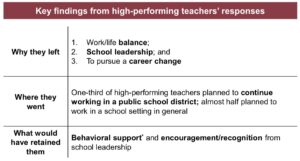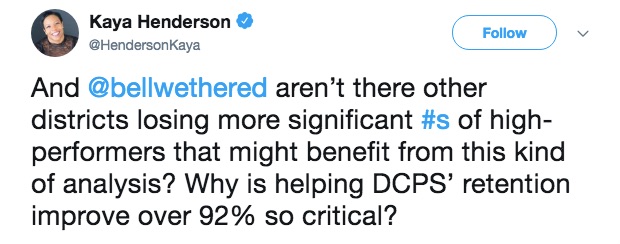This post is part of a week-long series about educator and leader pipelines. Read the rest of the series here.
Last Monday was the first day back for DC Public Schools (DCPS). Luckily, many DCPS students entered classrooms led by teachers rated “effective” or “highly effective.” In fact, the district retains 92 percent of these in-demand educators.
But what about the high-performing teachers who leave the district? There is a common misconception that a punitive evaluation system is the main issue driving out great DCPS teachers. Yet, when you actually ask teachers, this narrative doesn’t seem to tell the whole story.
DCPS surveys all teachers exiting the district to ask about why they left, where they went, and what would have made them stay. In a recent report, we took a closer look at these data and focused on high-performing teachers’ responses to better understand how to retain these teachers in particular.
Analyzing why great educators leave can be a touchy subject, so when we released the report, our approach was not appreciated by all:

Kaya and Dan are right in that, compared to other urban districts, DCPS does not have a problem retaining its high-performing teachers. We know that because of the district’s evaluation system, IMPACT, which meaningfully differentiates teachers’ performance:

But we still thought it important to review these findings. A rigorous evaluation system such as IMPACT makes the resulting data on what high-performing teachers want much more valuable than data from systems that struggle to identify outstanding teachers. By focusing on good and great teachers, our report aims to provide DCPS and other urban districts with strategies to intentionally retain these high performers.
Differentiating teacher retention by performance speaks to a larger research-backed theory: not all teacher churn is bad. Yes, in general teacher turnover is harmful to students, but when districts can replace teachers who leave with higher performing teachers, it is better for student achievement. DCPS is a shining example of this approach.
In case you missed our original report, here are the key themes we found in our analysis:
 These findings give DCPS and other similar urban school districts data to consider when making changes to retain their best teachers. They could give experienced, high-performing teachers more options for extended leave and part-time employment. They could address how school leaders show encouragement and recognition to high performers or think about systems for behavioral and instructional support. On the flip side, trying to retain potential career changers might not be a promising strategy since most of them say there was nothing the district could have done to change their mind.
These findings give DCPS and other similar urban school districts data to consider when making changes to retain their best teachers. They could give experienced, high-performing teachers more options for extended leave and part-time employment. They could address how school leaders show encouragement and recognition to high performers or think about systems for behavioral and instructional support. On the flip side, trying to retain potential career changers might not be a promising strategy since most of them say there was nothing the district could have done to change their mind.
Although DCPS already retains a large majority of its effective and highly effective teachers, we hope that our report will help the district continue to do so and potentially influence other urban districts that are considering retention strategies.
August 27, 2018
Want to Keep Great Teachers? Listen to What They Say.
By Bellwether

Share this article
More from this topic
Meeting the Moment: How 4 Philanthropic Foundations Are Stepping Up Right Now
Teaching Interrupted: How Federal Cuts Threaten a Promising Teacher Residency Program
Does Increasing Graduation Requirements Improve Student Outcomes?
No results found.